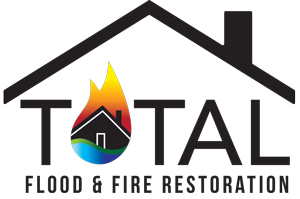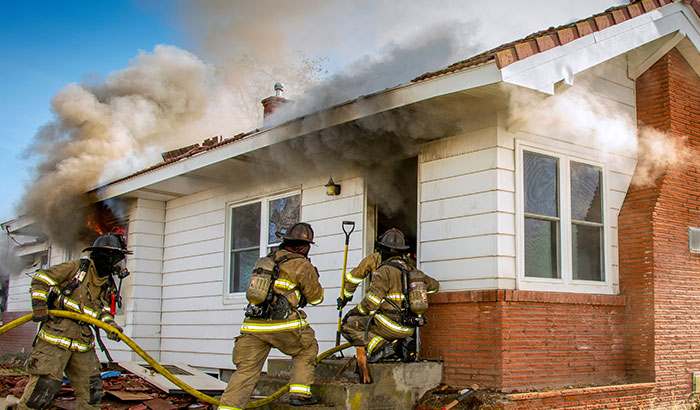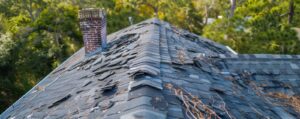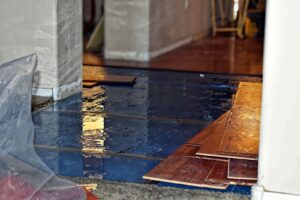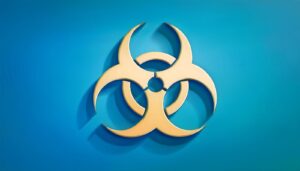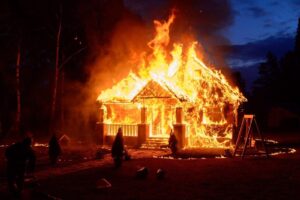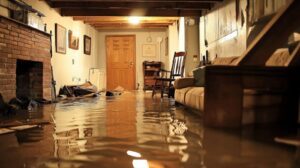House fires can be devastating, and people often want to know what to do in the aftermath. However, this article will focus on what NOT to do after a house fire.
Quick note: As you read, you’ll notice that many mistakes result in challenges with how your insurance company assesses the cost of repairs. The last thing you need after a house fire is navigating obstacles with your insurance claims.
Here are some common mistakes people make after they experience a house fire and why you should avoid them.
Entering the building without proper safety equipment or professional guidance.
- It is unsafe to enter a building after a fire without proper safety equipment because the structure may be unstable and at risk of collapse. There may be hidden hazards, such as electrical wires or gas leaks.
- The air inside the building may also be contaminated with toxic smoke and fumes, which can be harmful to your health if you inhale them. Additionally, there may be hot spots or smoldering areas that could reignite, putting you at risk of injury or death.
- Proper safety equipment such as a fire-resistant suit, respirator, and protective eyewear can help protect you from these hazards and minimize the risk of injury. It’s also important to have a professional inspect and clear the building before entering.
Touching or moving burned items before they have been properly inspected and cleared by a professional.
- It is important not to touch or move burned items after a house fire without proper inspection because they may be contaminated with hazardous materials such as asbestos, lead, or other toxins released during a fire. Additionally, burned items may have structural integrity issues and collapse or cause injury if mishandled.
- A proper inspection of burned items should be done by a professional with the necessary equipment and training to identify and handle hazardous materials safely. They will also determine which items are safe to keep and which should be appropriately disposed of. Additionally, they can guide you on proper handling and documenting the items for insurance purposes.
- It’s crucial to follow the guidance of professionals, as well as the instruction of your insurance company, to make sure that you do not compromise your health and safety.
Discarding damaged or contaminated items without proper documentation or guidance from insurance or fire officials.
- It is important not to discard damaged or contaminated items after a house fire without proper documentation or guidance from insurance or fire officials. These items may be needed as evidence for the insurance claim. Discarding items without proper documentation can complicate or invalidate the insurance claim.
- Additionally, some items may be contaminated with hazardous materials and require special handling and disposal. Improper disposal of these items can be dangerous for the environment and people living in the area.
- It is essential to work closely with your insurance company and fire officials to document the damage and determine which items can be safely salvaged, which should be properly disposed of and how to do it.
Attempting to clean or repair structural damage before it has been properly assessed and cleared by a professional.
- Safety: The structure of the building may be unstable and may put you at risk of injuries.
- Effectiveness: Repairing structural damage without proper assessment can result in ineffective or incomplete repairs.
- Insurance: Your insurance claim may be compromised without a professional evaluation of the damage.
- Building Codes: Improper repairs can result in a violation of building codes.
Failing to document and document the damage by taking photographs or videos before cleanup or repair work begins.
- Insurance: Documentation will help the insurance adjuster determine the extent of damage and the cost of repairs.
- Memory: Photos and videos will help you remember what needs to be replaced or repaired.
- Comparison: Before and after photos will determine the extent of the damage and track the progress of repairs.
Neglecting to change smoke detector batteries and testing them regularly.
- Lack of protection: Smoke detectors are a vital part of a home fire safety system. If the batteries are dead or the detector is not working properly, it may not provide the necessary protection in the event of another fire.
- False alarms: Smoke detectors that are not properly maintained may trigger false alarms, which can be disruptive and potentially dangerous.
- Failure to comply with building codes: Many building codes require smoke detectors to be in working order and to have fresh batteries. Failure to comply with these codes can result in fines or other penalties.
- Difficulty in getting insurance claims: Insurance companies may not cover fire damage if it is determined that the smoke detectors were not working properly.
Not getting professional help for emotional trauma caused by the fire.
- Emotional impact: Experiencing a fire can be traumatic and have a significant emotional impact on individuals and families. People may experience feelings of fear, anxiety, depression, or even Post-traumatic Stress Disorder (PTSD) as a result of a fire.
- Difficulty in coping: Without professional help, individuals may have difficulty coping with the emotional fallout from the fire and may struggle to return to their normal daily lives.
- Long-term effects: If left untreated, emotional trauma caused by a fire can have long-term effects on an individual’s mental and physical health, as well as their relationships and overall quality of life.
- Difficulty in an insurance claim: Failure to address emotional trauma caused by the fire may also affect your insurance claim, as the insurance company may not cover the cost of counseling or therapy.
- Difficulty in decision-making: Emotional trauma can affect your decision-making ability, leading to mistakes and further problems.
Now that you know what not to do after a house fire, here is the best thing you CAN DO before you attempt to manage the cleanup on your own – hire a professional!
Total Flood & Fire Restoration has trained professionals ready to clean up any fire damage your home may have experienced. Contact us today, and let us help you with your home or business’s fire damage restoration or cleanup needs.
